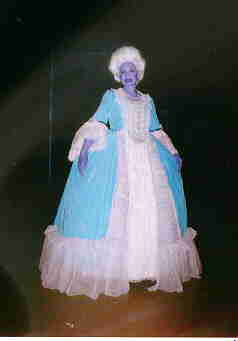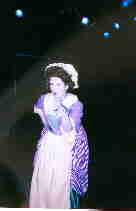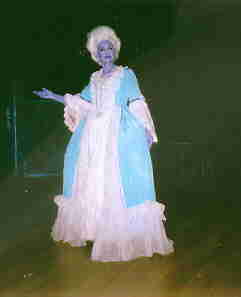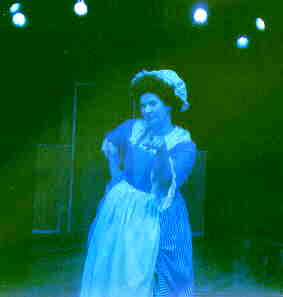MAIN STREET THEATER
Presents the World Premiere of
THE WITLINGS
A Comedy by A Sister of the Order
By Frances Burney
Directed by Rebecca Greene Udden
February 5 through March 8, 1998
Main Street Theater at Chelsea Market
4617 Montrose Boulevard

18th Century: Upper Class Society
------------------------------------------------
DRAMATIS PERSONAE
BEAUFORT........................................Dominique Gerard
CENSOR..........................................................Joel Stark
DABBLER.................................................Robert Leeds
JACK, Half-brother to Beaufort......................Scott Tesh
CODGER, Father to Jack, and Stepfather to Beaufort.............Jeffrey Lane
BOB, Son to Mrs. Voluble......................................................Mike Minor
WILLIAM, Footman.....................................Todd Greenfield
LADY SMATTER, Aunt to Beaufort...................Che Moody
CECILIA........................................................Sara Macaluso
MRS. SAPIENT....................................................Patti Bean
MRS. VOLUBLE..............................................Nathalie Cunningham
MRS. WHEEDLE, a Milliner.....................................Melinda deKay
MISS JENNY, her apprentice................................Celeste Cheramie
BETTY, Maid to Mrs. Voluble.........................Troy Scheid
MISS SALLY..................................................Kate Muttin
MISS POLLY...............................................Merrill Turner
YOUNG WOMAN IN SHOP.........................Claire Scheid
HER COMPANION..................................Jennifer S. Udden
------------------------------------------------
Act I: A Milliner's Shop
Act II: A Drawing Room at Lady Smatter's
Act III: Scene i: A Drawing Room at Lady Smatter's
Scene ii: An apartment at Mrs. Voluble's
Act IV: A Library at Lady Smatter's
Act V: A Parlor at Mrs. Voluble's
------------------------------------------------

18th Century: Upper Middle Class Society
The Story
Society is depicted in The Witlings through multiple plots that represent a thwarted and restored
romance, a literary party, and the activities of a millinery shop. The heroine and hero, Cecilia and
Beaufort, are to be married, but the news that Cecilia's banker has been ruined leads Lady
Smatter, Beaufort's aunt to demand that he break the engagement rather than marry an unportioned
woman. Lady Smatter distances herself from Cecilia, and Beaufort's friend, Censor, tells him to
placate his aunt by appearing obedient to her, an action Cecilia interprets as abandonment.

18th Century: Lower Middle Class Society
Lady Smatter, meanwhile, is distracted from Cecilia's plight by her position as the head of a literary
club. Her Esprit Party is notorious for the collective ignorance of its members, who include the
toadying plagiarist-poet Dabbler, Mrs. Sapient, and Beaufort's stepfather, Codger. Despite
prostestations to the contrary, the main aim of Lady Smatter's club is to provide its members with a
forum for mutual flattery and would-be authority rather than knowledgeable literary analysis.
Censor resolves the conflict between Beaufort and his aunt, and between the lovers, by supporting
Cecilia financially and blackmailing Lady Smatter into approving the marriage. He threatens to
tarnish her reputation with lampoons and ballads, a possibility she cannot tolerate.
The play's action begins and ends in the shop of a milliner, Mrs. Wheedle, and the home of Mrs.
Voluble, who rely on the literal and figurative fortunes of the upper class for their livelihood as
purveyors of hats and gossip, respectively.
---------from Barbara Darby
Frances Burney, Dramatist
(The University Press of Kentucky, 1997)
---------------------------------------------------------------------------------

Robert Leeds as Mr. Dabbler: The Use and A-Buse of Time
Interview with Che Moody
Lady Smatter in The Witlings
by Theresa Hyde
TheresaHyd@aol.com

Che Moody as Lady Smatter
Che Moody stars as the utterly charming Lady Smatter in Rebecca Greene Udden's 18th century
Masterpiece, The Witlings. She has appeared at MST in An Ideal Husband, Pride and Prejudice,
and Major Barbara. Elsewhere, she has worked at The Alley (Sunrise at Campobello), Houston
Grand Opera (Tales of Hoffman), TUTS (A Little Night Music), Stages (Coconuts), the A.D.
Players (Villa Real), and the Troupe Theater in New York (Ghosts). Her film work includes The
Lonely Guy, Zelig, and Legal Eagles. Ms. Moody studied at the Berghof Studio and Roundabout
Theater in New York and the Pasadena Playhouse in California.
THYDE: Tell us about the part you're playing in this play.....
CMOODY: Yes. I'm playing the part of Lady Smatter. This is actually the first production that this
play has received. It was written by Frannie Burney in the 18th Century. And Lady Smatter is the
leader, the head of a group of literary club or poets who love to pretend that they have all kinds of
knowledge about literary matters. And she's also in the center of a stormy situation concerning her
adopted son, also her nephew Beaufort. Beaufort is engaged to a young woman who has lost her
fortune. And in the 18th century, that was indeed a very serious thing. And so, she withdraws her
consent to the marriage, and that creates a lot of the upset in the play.
THYDE: How did you become a part of this play?
CMOODY: Well I have performed at Main Street before. I've been in theatre many, many years. I
started when I was 13 in Hollywood, I grew up in Hollywood. When I was 13, I attended Henry
Duffy's School of Theatre in Hollywood Boulevard. At 17, as soon as I graduated from High
School, I attended The Pasadena Playhouse in California. Which was, at that time, a State Theater
in California.
I've trained theatre all my life, all my life. I've been in most theatres in Houston, I've appeared at the
Alley, I was there for 6 years, with Nina Vance. This is my 3rd play with Main Street Theatre.
THYDE: Have you done any movies?
CMOODY: Yes, when I was living in New York. In the 80's, I did quite a few films. Among them,
Arthur, Zelig, and The Lonely Guy with Steve Martin. It was great fun, and I thoroughly enjoyed it.
Also did theater while I was in New York. Of course, that's what I was there for.
THYDE: Did Becky (Rebecca Greene Udden) call you for this part?
CMOODY: This is the funniest story because I had wandered into the theater one day, and said,
"Oh, is there anything for me this season, Becky?" And she says, "Well, take a look at this script,
The Witlings." And this was months and months ago. I took it home, and read it, and I thought it
was so amusing. I loved it. I brought it back, and put a note to Becky, "Oh, I think it's charming, I
love the play." But I never heard another word from her.
So I made arrangements to go skiing with friends in February. And so, I came in one day, and I
said to her, "Oh, I see that the Witlings is in February, I'm sorry I won't be here." And she says,
"Won't be here? You're in the play!"
"I AM!?!" (laughs). And she says, "You said you liked the part......"
I said, "Well, yes, but I never heard a word from you!"

So I had to go call my friends, and tell them that I am not going skiing, as
I am not gonna give up this wonderful part. Of course, it's been so much
fun.
THYDE: (laughing) So, you love theatre more than.........?
CMOODY: Oh well, Theatre is the heart of it. It's a wonderful company. It's really fun to be here.
THYDE: How did you come to Houston?
CMOODY: Well, it's strange. I was born in Houston, but I grew up in Los Angeles. But I, always,
would return to Houston. My family always had interest in Houston and California. Of course, in
those days it wasn't as much fun as it is now. Because it was waaaay back, you know. Houston
wasn't the wonderful, vital city that it is now.
THYDE: I know, there's so many theatres here, it's unbelievable. Who are your most favorite
actors?
CMOODY: Among men, I very much admire Anthony Hopkins. He's a wonderful actor. And of
course, way way back, I think Marlon Brando has remained my idol of all time. Of course, he
rarely acts now. But even now, when he does, it's a treat to see him. Among the women, I admire
the more established people like Vanessa Redgrave. People like that are always fun to see, see
them working.
Strangely, it really is, kind of a bitter thing that actresses of maturity are not allowed a chance to do
things. I mean, Vanessa Redgrave is just wonderful. She just gets more and more beautiful and
accomplished. And I think, the same thing for Julie Christie. She's in this movie that just opened and
she's allowed to play. Because, it's the youth cult, maybe that's coming around in just a little bit of a
cycle. And I think Gloria Stewart, who is 87 years old, who's in Titanic might get an Academy
Award! (beaming proudly). That's gonna strike a blow for the more mature actress.
THYDE: What qualities do you look for in an actor?
CMOODY: Well. That's difficult to say. Because, gosh, you take somebody like Daniel Day
Lewis, people like that......they have that......It's a total mystery, that riveting quality that they have.
Who knows what causes that? There's a kind of stillness, a focus, to these actors that you can't
take your eyes off of.
And the technique, I mean, the Pros. You just can't beat all that years of technique and experience.
Edith Evans, the famous actress said, "The best training for theatre is night after night, performing
for an audience." You can't beat that, you know. I think all training for theatre is good. I don't
believe in that old thing, in that you can't train for the theatre.
THYDE: Who influenced you as an artist?
CMOODY: Well, my teacher in New York, for ten years, was William Hickey. Bill Hickey, who
just recently died. He was nominated for an Academy Award for his role as the godfather in Prizzi's
Honor. He's a famous, famous teacher and actor. He had a tremendous influence on me. In the
depth of his understanding, I think it changed me completely. When I went to New York in the
80's, I studied with him. Bill Hickey taught from the actor's point of view
I studied with Gene Price, who founded the Roundabout Theatre, who taught from the director's
point of view. He also taught Billy Crystal, Judd Hirsch, and many other well known people. But he
treated everybody the same. He was very indulgent, as long as you were absolute and truthful. As
long as you were there, present, in the moment. He was a revelation. I studied with him many
years. And I guess, he would be the biggest influence on me.
Stanley Zareff, who comes down from New York, 2 or 3 times a year. He teaches here in
Houston. He has a whole group of actors who work with him. He has been a great influence. He's
New York based, but he comes to Houston and has intensive workshops.
Annalee Jefferies, currently has ActorSource, which is a workshop for Professional Actors here,
down at Diverse Works every week. And Annalee has been a big big wonderful influence on all of
the Acting Community here in Houston.

Nathalie Cunningham as Mrs. Voluble
But we, as Actors should always be working, always doing workshops. In
New York, actors are always in class, always studying. You never learn it
all.
THYDE: What would you like the audience to gain from watching this play?
CMOODY: WE want the audience to really enjoy it, and have a good time. And get a picture of
what it was like in the 18th century. In a way, there's a great deal that can be applied to modern
life. We can compare how desperate it was in those days, for a girl, not to be married. Our
heroine, Cecilia, is a very spunky girl, and she says, "Well, I'm going to get a job. Well, that was
unusual. It was a big tragedy if you didn't have money and you're independent. I think that's one of
the great things about the play, is in how important independence was.
THYDE: It's amazing because it's like reading 18th century literature, but you see it come alive with
all the wonderful costumes and the colors. The audience feels like they've travelled in time. It really
is a Masterpiece.
CMOODY: Yes, it's great fun to play. Because you can just go to town with all the style and have
a good time. And the audience enjoys going along with it. We want to see everyone here enjoying it
with us. We look forward to seeing you in the 18th Century.







